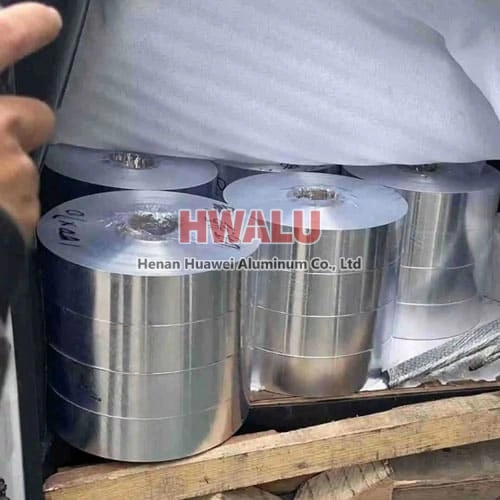Special applications of aluminum foil Aluminum foil is a type of product of aluminum alloy metal. It is made by directly rolling metal aluminum into thin sheets. Its thickness is usually less than or equal to 0.2mm. Like the thickness of a piece of paper, aluminum foil is also called aluminum foil paper. Aluminum foil has many uses, and common scenes include food packaging, pharmaceutical packaging, etc. At the ...
What is aluminum foil for wrapping Aluminum foil for wrapping is a thin, flexible sheet of aluminum that is commonly used for wrapping food items or other objects for storage or transportation. It is made from a sheet of aluminum that has been rolled out to a desired thickness and then processed through a series of rollers to give it the desired strength and flexibility. Aluminum foil for wrapping is availabl ...
Aluminum foil thickness for different purposes Alloy Alloy state Typical thickness(mm) Processing methods End use smoke foil 1235-O、8079-O 0.006~0.007 Composite paper, coloring, printing, etc. Used in cigarette packaging after lining, printing or painting. Flexible packaging foil 8079-O、1235-O 0.006~0.009 Composite paper, plastic film embossing, coloring, printi ...
Alloy parameters of aluminum foil for chocolate packaging Chocolate packaging aluminum foil is usually composed of aluminum and other alloying elements to increase its strength and corrosion resistance. Alloy series 1000, 3000, 8000 series aluminum alloy Alloy state H18 or H19 hardened state Alloy composition pure aluminum containing more than 99% aluminum, and other elements such as silicon, ...
Overview of aluminum foil for electronic products As one of the core materials of electronic devices, aluminum foil for electronic products has always been the focus of electrical appliance manufacturers. As a term that doesn't come up very often, you might have questions about it. What is aluminum foil for electronic products? What are the classifications of aluminum foil for electronic products? What are the a ...
Is aluminum foil a good insulator? It is certain that aluminum foil itself is not a good insulator, because aluminum foil can conduct electricity. Aluminum foil has relatively poor insulation properties. Although aluminum foil has certain insulating properties in some cases, its insulating properties are not as good as other insulating materials. Because under normal circumstances, the surface of aluminum foi ...
Aluminum foil plays a vital role in the construction of lithium-ion batteries. There are many models in the 1000-8000 series alloys that can be used in battery production. Pure aluminum foil: Pure aluminum foil commonly used in lithium batteries includes various alloy grades such as 1060, 1050, 1145, and 1235. These foils are usually in different states such as O, H14, H18, H24, H22. Especially alloy 1145. ...
Degreasing pollution is mainly manifested on the surface of the aluminum foil in 0 state. After the aluminum foil is annealed, it is tested by the water brushing method, and it does not reach the level specified in the water brushing test. The aluminum foil that requires the water-washing test is mainly used for printing, composite with other materials, etc. Therefore, the surface of the aluminum foil must be ...
Aluminum foil is a good packaging material and can be used for food packaging and pharmaceutical packaging. It can also be used as a conductive material. As a conductive material, aluminum foil has many advantages compared with other metals. What is the difference in conductivity between aluminum foil and other metals? This article will describe how aluminum foil conducts electricity compared to other metals. ...
1. Chemical composition: The alloy grades of aluminum foil for heat exchange fins mainly include 1100, 1200, 8011, 8006, etc. From the perspective of use, air conditioners do not have strict requirements on the chemical composition of aluminum heat exchange fins. Without surface treatment, 3A21 aluminum alloy has relatively good corrosion resistance, high mechanical properties such as strength and elongation, ...
Fire or explosion in aluminum foil rolling must meet three conditions: combustible materials, such as rolling oil, cotton yarn, hose, etc.; combustible materials, that is, oxygen in the air; fire source and high temperature, such as friction, electric sparks, static electricity, open flames, etc. . Without one of these conditions, it will not burn and explode. The oil vapor and oxygen in the air generated duri ...









